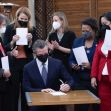A group of Hyatt corporation hotel employees who were laid off during the COVID-19 pandemic won the appeal of their class action suit against the hotel chain. They claimed Hyatt violated California law by refusing to give them timely payment for their accrued vacation time. The district court had granted the Hyatt Corporation summary judgment, but the Ninth Circuit Court of Appeals reversed and remanded the case while asking the lower court to decide whether “Hyatt acted willfully in failing to comply with the prompt payment provision of the California Labor Code (CLC).”
Plaintiff Karen Hartstein and members of her certified class were among the 7,000 Hyatt employees laid off in March 2020 as a result of the pandemic. They were subsequently terminated in June. They sued Hyatt for its failure to immediately compensate them for earned vacation time and for the value of the free hotel rooms that they received annually.
A three-judge panel of the Ninth Circuit Court of Appeals, in an opinion authored by Senior Circuit Judge A. Wallace Tashima on September 22, concluded that the “prompt payment provisions of the CLC required Hyatt to pay Plaintiffs their accrued vacation pay in March 2020.” However, the appellate court also ruled that the value of the complimentary hotel rooms to which they were entitled was excluded under the Fair Labor Standards Act (FLSA). The court affirmed that part of the decision by District Judge Dale S. Fischer of the U.S. District Court for the Central District of California.
Section 101 (a) of the California Labor Code says, in part, “If an employer discharges an employee, the wages earned and unpaid at the time of discharge are due and payable immediately.” Another Labor Code Section, 227.3, translates unused vacation time into wages, which must be paid at the employee's final wage rate.
In March 2020, Hartstein was informed of her furlough (also called ‘layoff’) and the fact that she would not continue to accrue vacation time for its duration. In June, she received another letter that informed her that her layoff would become a permanent discharge on June 27. That letter said she would then receive her compensation for her “accrued and unused” vacation time. A class action suit by Hartstein and her fellow employees was soon filed in Los Angeles Superior Court, which certified the class. It claimed that California law requires that “wages be paid upon discharge” and that the class members were entitled to “waiting time penalties, compensation for failure to furnish accurate wage statements, and unfair business practices” according to the Private Attorneys General Act (PAGA).
Plaintiffs rely on Section 2698 of the California Labor Code, which is the first section of PAGA and gives “aggrieved employees” the right to bring civil actions for Code violations. Successful suits can give plaintiffs $100 for each initial violation and $200 for each additional one. It also entitles winning plaintiffs to attorney’s fees and costs.
Judge Tashima explained that Judge Fischer had erred when she concluded that a “furlough was not a termination” because the “employee-employer relationship” still existed. He went on to explain that, according to precedent, “California has long regarded the timely payment of employee wage claims as indispensable to the public welfare.” Hyatt admitted that it owed employees their accrued vacation time, but it argued about the precise date that should be used for the calculation. Defendants argued that they were not required to pay for accrued vacation time until the final June termination.
The California Supreme Court disagrees. It has ruled that accrued vacation time must be paid “immediately upon discharge.” Unfortunately, neither the Labor Code nor the Supreme Court have precisely defined “discharge.” However, Tashima wrote, the “California Division of Labor Standards Enforcement (“DLSE”) has answered the question explicitly.” DSLE, which is the State agency that enforces California labor laws, has said that “if an employee is laid off without a specific return date within the normal pay period (underlines in original), the wages earned to and including the layoff date are due and payable in accordance with Section 201.” Tashima pointed out the public policy behind this Section, which is “to avoid depriving employees of the necessities of life and making them “a charge upon the public.”
An additional Opinion Letter from DLSE states that, “a temporary layoff with no specific return date within the normal pay period is a discharge… requiring the immediate payment of accrued wages.” Thus, Tashima determined that “the temporary furlough in March 2020 triggered the prompt payment requirement of § 201 because, at eight to twelve weeks, there was no specific return date within the normal pay period.”
Although Hyatt disputed DLSE’s opinion, the Ninth Circuit bowed to the DSLE because of its “expertise and special competence.” The Court also remanded the question of whether Hyatt had a good faith belief in its arguments about when payments to class members were due.
However, the District Court’s exclusion to withhold payment for unused complimentary hotel rooms was upheld. Tashima classified the free rooms as an example of “discounts on employer-provided goods and services,” which were properly “excluded from the calculation of Plaintiff’s regular rate of pay.”
The Ninth Circuit opinion concluded that DLSE’s Opinion Letter makes it clear that temporary layoffs without specific return dates “trigger the prompt payments provision” of the CLC. “Hyatt should have paid accrued vacation pay on the date of the class members’ initial layoff,” Tashima wrote. As a result, he reversed the district court’s grant of summary judgment in favor of Hyatt as to the vacation pay and waiting time penalties claims and remanded it to the district court to consider whether Hyatt acted willfully.
COVID clearly created enormous problems for employees who lost their jobs. This ruling will help clarify proper timelines and the reasons why they should get what they earned and deserve.






